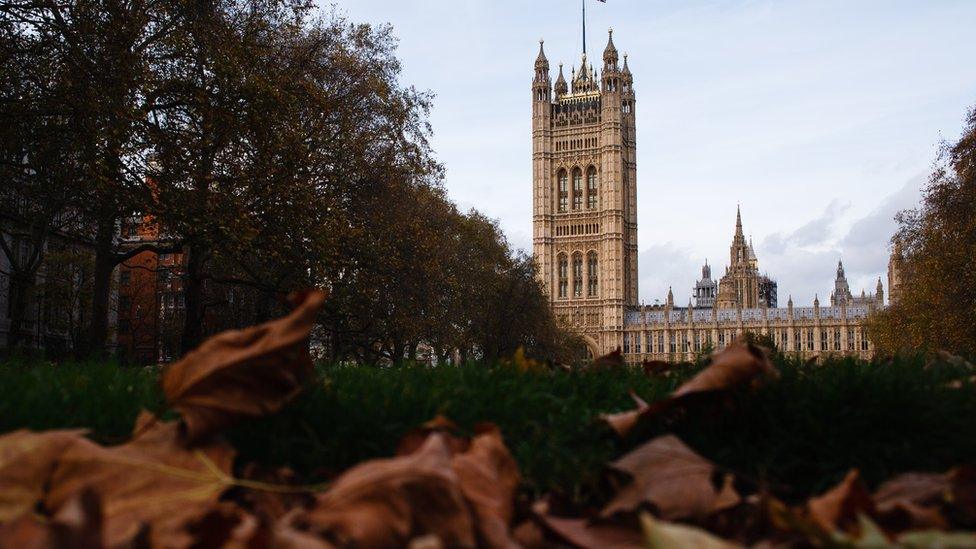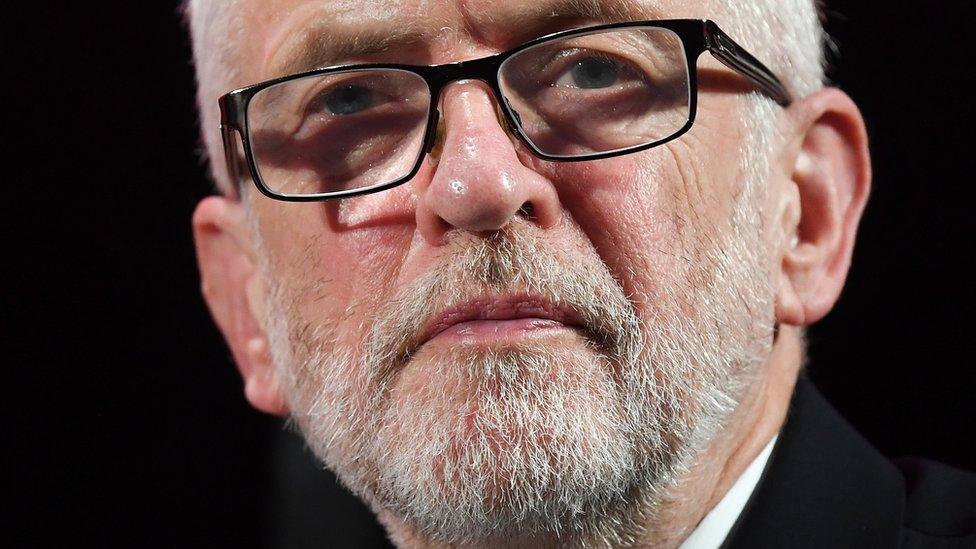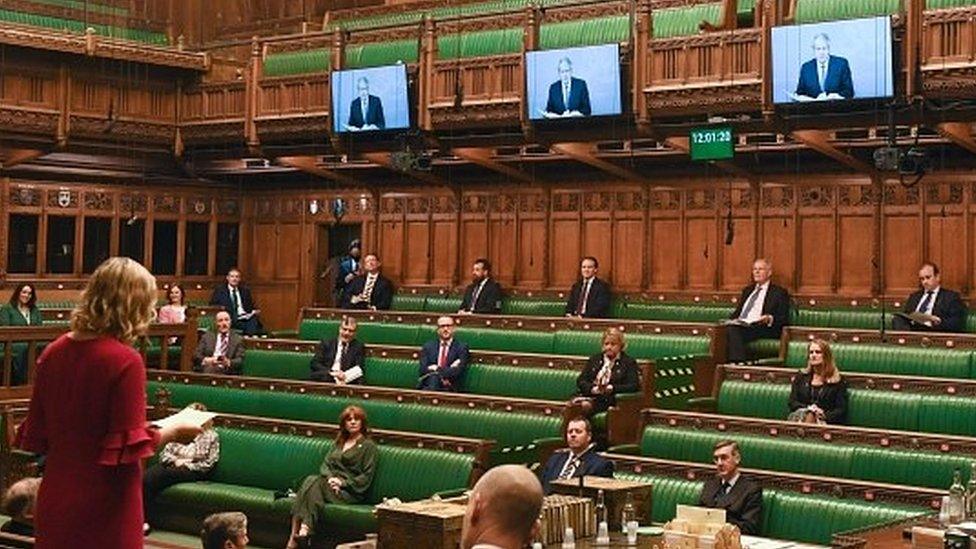The week ahead in Parliament
- Published

It may not be the all-singing, all-dancing multi-year announcement on tax and spending planned before the pandemic, but the chancellor's spending review statement on Wednesday will still dominate the parliamentary week - not least because any financial planning is inevitably shrouded in the uncertainties around coronavirus and the post-Brexit trade talks.
MPs will crawl over the figures released alongside the statement for clues as to what big spending plans might be dropped when the vast bill for keeping the economy afloat falls due.
Elsewhere, it's a week of Brexit preparation, with both houses processing a cascade of Brexit regulations. The big one will be the orders underpinning controls on heavy lorries in Kent, if there are delays at the Channel Tunnel and the ports at the end of the Brexit transition.
But, as ever in Westminster, there will be sub-plots. Here are four to look out for:
Dissing the PAC: The rumbling row over the distribution of millions of pounds of taxpayers money under the government's Towns Fund - which the powerful Public Accounts Committee has found was "not impartial" - saw the communities secretary, Robert Jenrick, take a swipe at the chair of the PAC, Labour ex-minister Meg Hillier, remarking in the Commons that "her approach was more partisan than one would expect." Is this wise? The PAC is not keen on pushback - it works on a cross party basis and has never seen a minority report in 160 years.
The dance of the factions: Conservative groupings are keeping a beady eye on their leader - with core Brexiteers determined to ensure there's no backsliding on Brexit, while those who're sceptical about the handling of the pandemic (often, but not exclusively, the same people) are seeking to crystallise an alternative approach. Meanwhile, Labour has its own troubles - with Keir Starmer's refusal to restore the whip to his predecessor, Jeremy Corbyn provoking talk of a leadership challenge. The Commons will not be the prime field of battle for Labour but the other parties will be keen to encourage red-on-red sniping.
Virtual stalemate: The hard case of former minister Tracy Crouch being barred from participating virtually in a debate on breast cancer, because she is self-isolating while being treated for breast cancer, led to a hurried move to loosen Commons rules - to allow vulnerable MPs to take part in debates from home. But the plan was blocked by MPs who thought it didn't go far enough and the result may be to force an actual debate on the proper level of virtual participation. With Jacob Rees Mogg firmly against a virtual Commons and a considerable lobby of senior MPs firmly in favour, an interesting clash of cultures looms.
Sound chaps: Half a year on from the first lockdown, it is astonishing that ministers, and indeed the prime minister, are still giving evidence to select committees via iffy broadband and tinny microphones with terrible sound quality. Twice last week the prime minister's contributions to the Commons from his self-isolation in Downing Street were marred by substandard sound quality. Downing Street is said to be seeking a sound engineer to sort the problems out. The sooner, the better.
And here's my rundown of the week ahead:
Monday 23 November
The Commons opens (14:30) with an hour of Education Questions. After that, expect the usual quota of post-weekend ministerial statements and urgent questions.
Then, MPs will be asked to approve regulations to restrict the movements of heavy lorries in Kent. The Draft Heavy Commercial Vehicles in Kent (No. 1) (Amendment) Order 2020 amends the special regulations designed to control lorries queuing to access the Channel Tunnel, in the event of delays after the end of the Brexit transition period at midnight on 31 December.
The order adds new requirements for drivers to obtain a valid Kent Access Permit (KAP) to allow them to take goods to the EU via the Channel Tunnel or the Port of Dover. And it allows the government to restrict KAPs to lorries carrying only priority goods. The government's reasonable worst-case scenario suggests delays, caused by the inspection of customs documents, could cut the freight flow to 60 to 80 per cent of usual levels in the weeks following the end of the transition period - and that could lead to queues through Kent of up to 7,000 lorries in February.
Incidentally, the House of Lords EU Goods sub-committee (12:30) will hear evidence from two panels of witnesses on traffic management in and out of Kent and how the KAPS will be enforced.
In Westminster Hall, MPs debate e-petitions 333869 and 309851, relating to Covid-19 restrictions on gyms and sport. The first petition, which has more than 608,000 signatures, states: "In the event of a spike we would like you not to close gyms as a measure to stop any spread of Covid."
The second petition, which has more than 257,000 signatures, argues that the Government should allow golf courses to open so families or individuals can exercise safely.
MPs then turn to a petition calling for sanctions on members of the Nigerian government and police force involved in any human rights abuses. It has more than 219,000 signatures.
On the committee corridor, the special Defence Sub-Committee on Foreign Involvement in the Defence Supply Chain (15:15) hears expert evidence on both the new National Security and Investment Bill (which received its second reading in the Commons this week) and involvement from hostile foreign states.
In the Lords (13:00), ministers field questions on making misogyny a hate crime, opportunities for new entrants into farming, the future of high street travel agents, and protecting migrant women who have been subjected to domestic abuse and have no recourse to public funds
Then peers continue their detailed report stage scrutiny of the United Kingdom Internal Market Bill. The main issues in play include a one-month consent mechanism with devolved administrations on regulations, proposed by Labour's Baroness Hayter, the crossbencher Baroness Finlay and the Labour former Welsh Secretary, Lord Hain.
There are also amendments to ensure the independence of the proposed Office for the Internal Market from the Competition and Markets Authority, and on the Shared Prosperity Fund. The government had put down amendments which would require consultation with the devolved administrations and a review of the operation of the legislation after a year.
Tuesday 24 November
MPs open (11:30) with Foreign, Commonwealth and Development Office Questions.
The day's Ten Minute Rule Motion, from the Conservative Alan Mak, is on creating a new national system of volunteer reservists for the NHS in England, modelled on Armed Forces reservists and police special constables. It proposes a new, uniformed standing reserve of clinical and non-clinical volunteers, which NHS hospitals and other Health Service bodies can call upon when staffing demands increase - for example during a public health emergency, a seasonal flu epidemic, or critical incidents like terrorist attacks or major accidents.
Next, MPs look at Lords amendments to the Private International Law (Implementation of Agreements) Bill. Back in June peers voted to remove a clause that would have given UK and devolved ministers powers to implement any international law agreement by regulations rather than legislation, on the grounds that it gave ministers too much power to make law without reference to Parliament.
There will also be debates on a couple of issues around the in-house disciplinary system. First, the appointment of members to the independent expert panel, which will consider complaints of bullying and harassment against MP, brought under the new Independent Complaints and Grievance Scheme (ICGS). Second, whether to approve the Committee on Standards' recommendations on closing a loophole in the system which means that complaints against former MPs who are now in the House of Lords, about their conduct while MPs, cannot be investigated.
In Westminster Hall, subjects for debate include the adequacy of funding for local authorities during the pandemic (14:30) and business and economic opportunities after Huawei's exclusion from the 5G network (16:30)
On the committee corridor, Health and Social Care/Science and Technology joint inquiry, "Coronavirus: Lessons learnt," (10:15) will question experts on the effectiveness of the government's actions - and then (11:00) they will quiz Health Secretary Matt Hancock on the effectiveness of test, trace and isolate, mask-wearing, social distancing, and lockdown in containing the coronavirus.
Business, Energy and Industrial Strategy (BEIS) continues its "levelling up" inquiry (10:30) with an evidence from city mayors - including Bristol's Marvin Rees, Leicester's Sir Peter Soulsby and Newham's Rokhsana Fiaz - plus representatives from the Midlands Engine, the Northern Powerhouse and the Western Gateway. The aims is to look how far "powerhouses" and city mayors have enhanced economic capacity and delivery in their areas.
Defence Secretary Ben Wallace is before the Defence Committee (15:15) to talk about Defence's contribution to the UK's pandemic response - although the implications of the defence review announced by the prime minister are bound to come up.
In the Lords (12:00), question time ranges across the benefits of adult learning delivered through the Union Learning Fund, money spent on the Palace of Westminster Restoration and Renewal project per week, and protecting lesbian, gay, bisexual and trans people from domestic abuse.
Then, peers turn to the detail of the Covert Human Intelligence Sources (Criminal Conduct) Bill. This is the probing, shadow-boxing stage of the process, so votes are not usually held. There will be probing amendments to tease out issues around immunity from either civil or criminal liability, civil redress, prior judicial authorisation, necessity and proportionality of a criminal conduct authorisation, and the code of practice for such sources.
Wednesday 25 November
Commons business opens (11:30) with half an hour of Women and Equalities Questions, followed, at noon by Prime Minister's Questions. But that will probably be eclipsed by the statement from the chancellor, Rishi Sunak, on the 2020 spending review.
The day's Ten Minute Rule Bill, from Labour's Gerald Jones, is the Driving Offences (Amendment) Bill, which aims to change the law on prosecution of driving offences that occur on private land next to a public road. This follows from the case of a child in his Merthyr Tydfil and Rhymney constituency who was killed by a runaway vehicle that rolled from a private drive down a hill. Mr Jones says the case could not be prosecuted under current legislation, so he wants the law changed.
The day's main debate is on the new UK-Japan Comprehensive Economic Partnership Agreement.
In Westminster Hall, there's a bit of a Northern Powerhouse flavour to events, with debates on infrastructure spending in the north of England (09:30) and on the government's levelling up agenda and the Tees Valley (16:30). Labour's Clive Efford leads a debate on the future of football governance (14:30).
In the Lords (12:00), questions to ministers range across equitable access to vaccines for Covid-19, establishing new lorry customs sites close to ports and strategic road networks in Wales, and reviewing government policies on nuclear weapons.
Then peers move on to their final day of report stage consideration of the UK Internal Market Bill. Key issues include state aid and devolved authorities.
Thursday 26 November
MPs begin their day (09:30) with forty minutes of Environment, Food and Rural Affairs Questions.
This is followed by a mini-question time for the MPs who speak for the Church Commissioners, the House of Commons Commission and Parliamentary Works Sponsor Body, the Public Accounts Commission and the Speaker's Committee on the Electoral Commission.
Then comes the weekly Commons business statement from the leader of the House. Jacob Rees-Mogg.
The main debates, chosen by the Backbench Business Committee, are on the final report from Climate Assembly UK on the path to net zero, and the Work and Pensions Select Committee Report on the DWP's response to the coronavirus outbreak.
In Westminster Hall, there are debates on the effect of the Covid-19 pandemic on freedom of religion or belief (13:30), and international development and gender-based violence (15:00).
The Public Accounts Committee takes evidence on managing colleges' financial sustainability (10:00).
In the Lords (12.00). ministers field questions on the 2021 G7 Summit in the UK, the SEND Futures initiative and internal review of special educational needs provision (that's from the former education secretary, Lord Blunkett), and the report by the Select Committee on the Rural Economy "Time for a strategy for the rural economy".
Then peers consider Commons reasons for rejecting their amendments to the Parliamentary Constituencies Bill - the measure to redraw the electoral map so that there is less variation in the number of voters in Commons seats. The Commons voted to reject a series of amendments stipulating that constituency boundaries should be reviewed every ten years, rather than every eight; to transfer the power to appoint deputy chairs of the boundary commissions from the Lord Chancellor to the Lord Chief Justice, and other issues. The appointments issue may be a sticking point.
Next, it's peers' turn to debate the Draft Heavy Commercial Vehicles in Kent (No. 1) (Amendment) Order 2020, which will have been before the Commons on Monday.
Friday 27 November
The Commons is not planning any further sitting Fridays this year, but a determined hard core of peers are in action (11.00) and will be debating regulations on audiovisual media services, renewal of radio licences, supplementary protection certificates and product safety, and Metrology etc.
- Published19 November 2020

- Published19 November 2020

- Published13 November 2020
